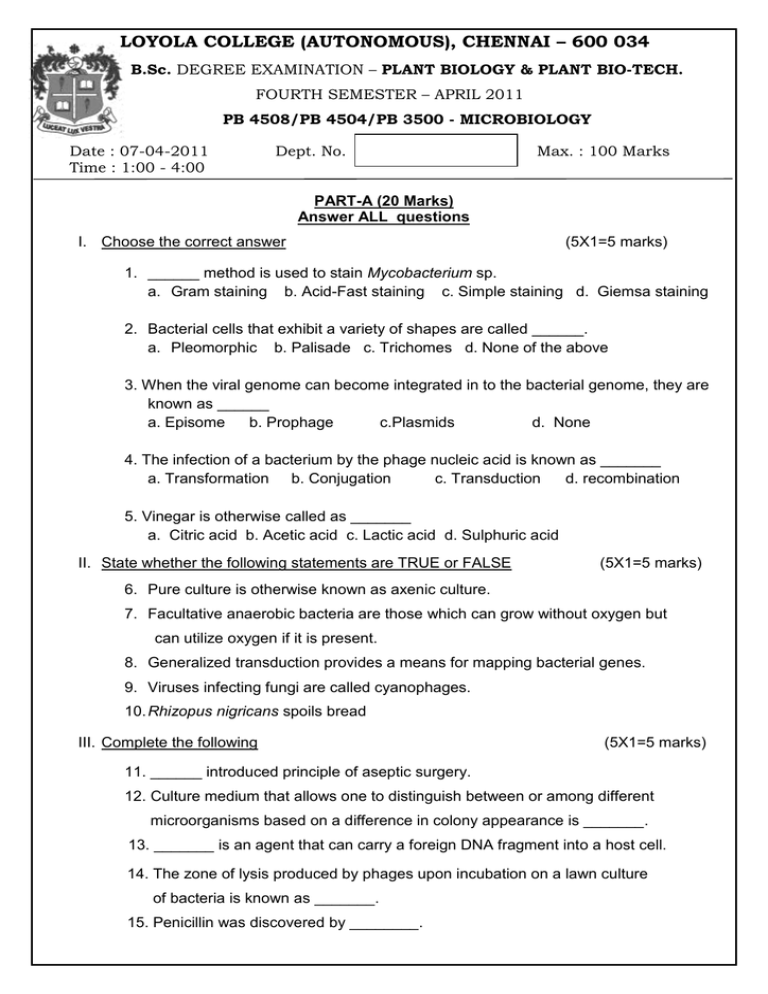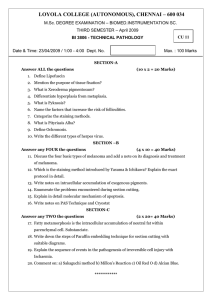LOYOLA COLLEGE (AUTONOMOUS), CHENNAI – 600 034
advertisement

LOYOLA COLLEGE (AUTONOMOUS), CHENNAI – 600 034 B.Sc. DEGREE EXAMINATION – PLANT BIOLOGY & PLANT BIO-TECH. FOURTH SEMESTER – APRIL 2011 PB 4508/PB 4504/PB 3500 - MICROBIOLOGY Date : 07-04-2011 Time : 1:00 - 4:00 Dept. No. Max. : 100 Marks PART-A (20 Marks) Answer ALL questions I. Choose the correct answer (5X1=5 marks) 1. ______ method is used to stain Mycobacterium sp. a. Gram staining b. Acid-Fast staining c. Simple staining d. Giemsa staining 2. Bacterial cells that exhibit a variety of shapes are called ______. a. Pleomorphic b. Palisade c. Trichomes d. None of the above 3. When the viral genome can become integrated in to the bacterial genome, they are known as ______ a. Episome b. Prophage c.Plasmids d. None 4. The infection of a bacterium by the phage nucleic acid is known as _______ a. Transformation b. Conjugation c. Transduction d. recombination 5. Vinegar is otherwise called as _______ a. Citric acid b. Acetic acid c. Lactic acid d. Sulphuric acid II. State whether the following statements are TRUE or FALSE (5X1=5 marks) 6. Pure culture is otherwise known as axenic culture. 7. Facultative anaerobic bacteria are those which can grow without oxygen but can utilize oxygen if it is present. 8. Generalized transduction provides a means for mapping bacterial genes. 9. Viruses infecting fungi are called cyanophages. 10. Rhizopus nigricans spoils bread III. Complete the following (5X1=5 marks) 11. ______ introduced principle of aseptic surgery. 12. Culture medium that allows one to distinguish between or among different microorganisms based on a difference in colony appearance is _______. 13. _______ is an agent that can carry a foreign DNA fragment into a host cell. 14. The zone of lysis produced by phages upon incubation on a lawn culture of bacteria is known as _______. 15. Penicillin was discovered by ________. IV. Define the following (5X1=5 marks) 16. Monera 17. Lyophilization 18. Log Phase 19. Virion 20. BOD PART-B Answer the following each within 500 words. Draw diagrams wherever necessary (5X7=35 marks) 21. a) List the contributions of: i. Robert Koch (3.5 marks) ii. Louis Pasteur (3.5 marks) (or) b) Write the principle and procedure of Gram staining. 22. a) Describe the ultra structure of Bacterial cell. (or) b) Explain briefly any two methods of isolating pure culture. 23. a) Give an account on Enzymes: its nomenclature and characteristics. (or) b) Write notes on TCA cycle. 24. a) Briefly explain about the cultivation of viruses. (or) b) Give a brief account on classification of viruses. 25. a) Elaborate on the various practices used for food preservation. (or) b) Industrial production of Alcohol- Explain. PART-C Answer any THREE of the following, each with 1200 words Draw diagrams wherever necessary (3X15=45 marks) 26. Discuss in detail about the major characteristics of microorganisms. 27. Describe in detail about the techniques used in the quantitative measurement of bacterial growth. 28. Write in detail: i. Conjugation (7.5 marks) ii. Transformation (7.5 marks) 29. Elaborate in detail about the structure and lytic cycle of Bacteriophages. 30. Give a detailed account on sewage treatment. $$$$$$$





